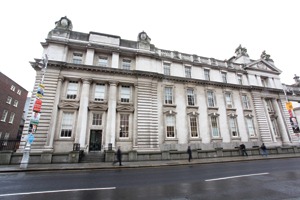The good policy guide
 Peter Cheney examines how the political parties make decisions and the ‘dos and don’ts’ when lobbying.
Peter Cheney examines how the political parties make decisions and the ‘dos and don’ts’ when lobbying.
Much of the research behind manifestos and ministerial announcements is done by staff behind the scenes in Government Buildings, Leinster House, and party headquarters.
Drawing on their departments and 36 special advisers, government parties have a natural advantage over the opposition. Most ministers have a policy adviser and press adviser (eolas, issue 6, page 102-103) with larger teams assisting the Taoiseach and Tánaiste.
Each main party has a policy or research office, but TDs and senators are generally seen as the best contact points, especially those with a strong interest in a particular issue or a seat on a relevant Oireachtas committee.
Practicalities
eolas has asked the main parties to explain how they formulate policy and what advice they would give to those seeking to meet them. Useful tools for such a meeting could include:
• a short pre-brief in advance (covering the range of topics which are likely to come up);
• a briefing note for the meeting (one-page summary with clear action points);
• a draft suggested parliamentary question;
• a draft letter to a Minister;
• a request to meet an Oireachtas committee (if desired).
Detail is not necessarily a drawback. “Know the subject or area as much as possible,” a Fianna Fáil staffer suggested. “Detail is very important as only then can you look at it from a political viewpoint. Get viewpoints from more than one angle and experiences in other countries if applicable.” Sinn Féin emphasised the need for presenting specific priorities, recommendations and actions (both short-term and long-term).
Crucially, a party’s support for a policy should not be taken for granted. It’s important to consider how, or indeed whether, the idea fits with the party’s objectives (see opposite) and, in the case of governing parties, the Programme for Government.
Fine Gael points to its “very extensive policy bank” developed in run-up to the general election, which provides its “guiding principles” in each portfolio area. Labour is looking for policy that is well-researched, costed and in line with its values.
Fianna Fáil prefers ideas that that will “create improvements for the majority of people rather than small issues that only impact on the few.” They also have to catch the public imagination. “Equality is our watchword,” Sinn Féin said, adding that it wants to “protect and advance citizens’ rights.”
Processes
Internal processes for discussing and approving policy vary between parties. Fine Gael changed its model after entering government. At present, it has a small research unit which supports 11 internal policy committees. Each committee is chaired by a TD and frequently attended by ministers to allow members to feed into government policy development. Over the coming months, it will establish a policy and research office to support the parliamentary party.
Labour policy is generally written by the Oireachtas member and his or her staff, using input from interested parties or experts in the area. The draft policy document is then considered by the parliamentary Labour party, allowing other members to comment and make recommendations.
Labour also has a dedicated research officer who can support Oireachtas members’ staff and liaise with ministers and their staff.
In Fianna Fáil, the Oireachtas members “do the ground work” and select their preferred areas before a wider consultation takes place. This involves a range of external groups including NGOs. From its experience in government, Fianna Fáil found that expert groups were “crucial” to success when changing a policy; a proper communication plan was also important for explaining the rationale.
Sinn Féin’s main policy-making body is the ard fheis, where motions can be proposed by branches (cumainn) and the party executive (ard chomhairle). Decisions on more immediate strategy are taken by the ard chomhairle e.g. on Martin McGuinness’ nomination for the Irish presidential election.
The party has tried to “democratise the policy-making process as much as possible” through localised policy review groups which gather the membership’s views.
Uniquely, it is in government and opposition at the same time. At its ardfheiseanna, eolas has noted the more measured speeches of Northern ministers compared to the radical rhetoric of Southern members.
Sinn Féin holds negotiations with the UK Government on non-devolved matters e.g. taxation and welfare. The four other main Northern parties have small policy offices and the Executive, collectively, has 19 special advisors.
There is no shortage of ways to access the political system and politicians are open to ideas. However, time and money (or the shortage thereof) are two of the most important priorities for policy staff. The earlier an idea is put forward, the more attention it is likely to receive. And with all eyes on the economy, the parties are especially interested in the financial consequences of a proposal.
Summing up a widespread view, a Labour researcher said that recommendations “should have a practical, positive effect on peoples’ lives and be cost-neutral, or ideally, present cost-savings to the taxpayer.”
Key policy themes
Fine Gael
• Equality of opportunity
• Enterprise & reward
• Security
• Integrity
• Hope
Labour
• Freedom
• Equality
• Community
• Democracy
Fianna Fáil*
• Unity
• A distinctive national life
• Religious and civil liberty, equal rights, equal treatment & equal opportunities
• Develop the resources & wealth of Ireland to their full potential
• Protect the natural environment & heritage
• Promote the family & a wider sense of social responsibility
• Maintain the status of Ireland as a sovereign state
• Reform the laws & institutions of State
Sinn Féin
• Unity
• Economy
• Accountability in governance
• Agriculture & fisheries
• Education
• Local communities made safe
• Health
*constitution aims





